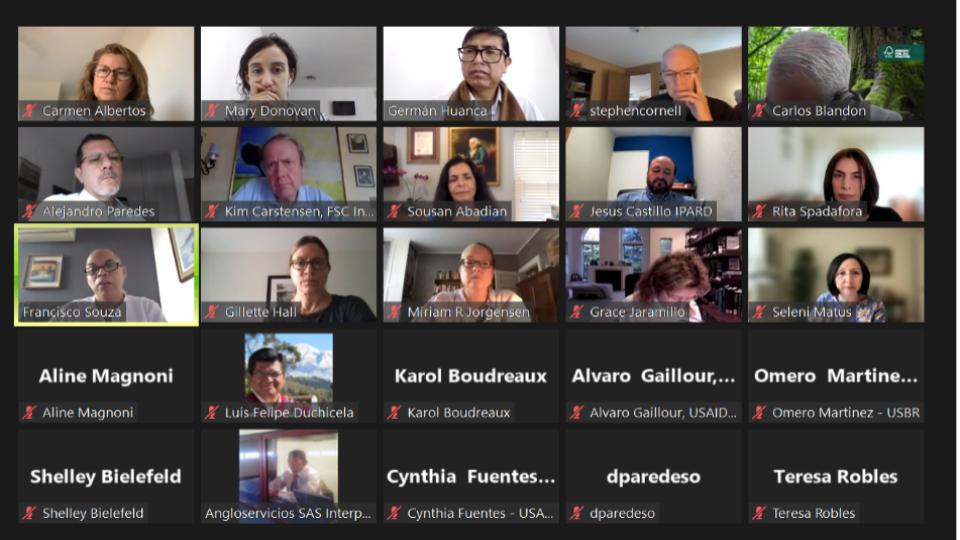Identifying the Key Challenges of Indigenous Economies
The FSC Indigenous Foundation convened a workshop with academics and experts in the field of Indigenous economies.
Indigenous economies comprise a large spectrum of activities – from producing açaí or quinoa to energy or tourism enterprises. In some regions economies are based on productive systems for self-consumption, hunting and fishing, the collection of leaves, fruits, and everything that the forest provides to meet basic needs. In other regions, Indigenous Peoples have developed sophisticated production models and are connected to markets with value chains based on forest products or tourism services highly valued by international markets.
Traditional economic and social development indicators may not capture the value of Indigenous economies, however, Indigenous economies provide invaluable contributions to the environment, making them of vital importance to humanity, and providing not only basic goods, but also invaluable public goods to international markets. The FSC Indigenous Foundation (FSC-IF) is committed to gather the important lessons to be learned from Indigenous economies.
On September 20th, 2021, the FSC-IF convened a virtual workshop with academics, researchers and development practitioners to identify key challenges of Indigenous economies. The workshop also presented the opportunity to identify those interested in forming a working group on Indigenous economies – a group that will identify innovative Indigenous economic models and help fulfil one of the objectives of the Indigenous Peoples Alliance for Rights and Development (IPARD) Program.
Kim Carstensen, Director General of FSC, Luis Felipe Duchicela, Senior Advisor on Indigenous Peoples at USAID, and Francisco Souza, Managing Director of the FSC Indigenous Foundation opened the workshop, confirming the commitment of FSC, USAID and the FSC Indigenous Foundation to work to strengthen Indigenous economies.
Stephen Cornell, Professor and Chair of the Native Nations Institute at the University of Arizona, gave a presentation concluding that maximizing Indigenous decision-making responsibility and power, investing in Indigenous governing capacity, and respecting self-governing Indigenous nations and their approaches, increases the chances of achieving sustainable development not only for Indigenous Peoples but also for the global community.
“Indigenous development is in fact in the interests of encompassing states, but it is unlikely to happen unless it is guided by Indigenous preferences and Indigenous decisions,” Cornell concluded.
Carmen Albertos, Indigenous Peoples and Diversity Principal Specialist at Inter-American Development Bank gave a presentation on the definition of Indigenous economies and enumerated some challenges facing them, including gaps of public investment in Indigenous territories, absence of affirmative action policies and limited resources and capacities to conduct profitable business.
“What we need is a new comprehensive policy framework with affirmative action activities, to create the enabling conditions for Indigenous Peoples to succeed in a higher scale and overcome a disadvantaged position,” she remarked.
Next, participants discussed the key challenges of Indigenous economies in break-out rooms, sharing rich experiences from Latin America, Australia, Canada and beyond.
The diverse expertise of the participants nevertheless converged on some central themes, including the importance of ensuring Indigenous Peoples’ land security and access to natural resources, the need for policies and programs aimed to promote businesses in areas where Indigenous Peoples have a clear competitive advantage, and the need to build capacity without breaking the link to traditional culture.

Participants identified discrimination, systemic racism and lack of recognition of identity as signification challenges facing Indigenous economies, as well as logistic factors such as access to finance and cost of transport.
At the end of the workshop, German Huanca, Program Lead on Business Partnerships and Indigenous Economy for the IPARD Program, underlined the importance of forming an Indigenous Economic Working Group to assess different economic models. These models will form the base for the partnerships and enterprises that IPARD will strengthen and promote.
If you are interested in getting involved, please email a.paredes@fsc.org
